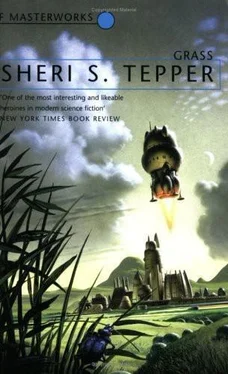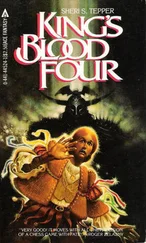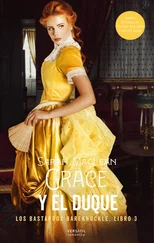Sheri Tepper - Grass
Здесь есть возможность читать онлайн «Sheri Tepper - Grass» весь текст электронной книги совершенно бесплатно (целиком полную версию без сокращений). В некоторых случаях можно слушать аудио, скачать через торрент в формате fb2 и присутствует краткое содержание. Город: London, Год выпуска: 2002, ISBN: 2002, Издательство: Gollancz, Жанр: Фантастика и фэнтези, на английском языке. Описание произведения, (предисловие) а так же отзывы посетителей доступны на портале библиотеки ЛибКат.
- Название:Grass
- Автор:
- Издательство:Gollancz
- Жанр:
- Год:2002
- Город:London
- ISBN:9781857987980
- Рейтинг книги:4 / 5. Голосов: 1
-
Избранное:Добавить в избранное
- Отзывы:
-
Ваша оценка:
- 80
- 1
- 2
- 3
- 4
- 5
Grass: краткое содержание, описание и аннотация
Предлагаем к чтению аннотацию, описание, краткое содержание или предисловие (зависит от того, что написал сам автор книги «Grass»). Если вы не нашли необходимую информацию о книге — напишите в комментариях, мы постараемся отыскать её.
Grass — читать онлайн бесплатно полную книгу (весь текст) целиком
Ниже представлен текст книги, разбитый по страницам. Система сохранения места последней прочитанной страницы, позволяет с удобством читать онлайн бесплатно книгу «Grass», без необходимости каждый раз заново искать на чём Вы остановились. Поставьте закладку, и сможете в любой момент перейти на страницу, на которой закончили чтение.
Интервал:
Закладка:
“I wondered about Commoner Town,” said Rigo. “On the maps it shows as a considerable area, some fifty miles long and two or three miles wide, completely surrounded by forest. I understand it is entirely given over to commerce or farming. When we arrived, I saw roads in and around Commoner Town, though there are none on the rest of the planet.”
“As I have previously explained to your wife, Ambassador, there is no grassland around Commoner Town. When we speak of the town, we mean the whole area, everything right down to the edge of the swamp. Here on Grass, where swamp is, trees are, as you can see if you look to your left. That is the port-forest coming up below. Quite a different surface from the rest of the planet, is it not? It doesn’t matter if they have roads in Commoner Town, because there is no grass to destroy, and they cannot get out through the swamp.” Obermun bon Haunser pointed down at the billowing green centered with urban clutter, his nostrils flaring only very slightly in what was unmistakably an expression of contempt. He had spoken of the roads as though they were something malevolent, something seeking subtle egress, like serpents caged against their will.
Stella started to blurt something but held it in as she received the full force of a forbidding glare from her father.
“You prefer they not get out?” Anthony asked, with precisely the right tone of disingenuous interest. “The roads or the commoners? Why is that?”
The Obermun flushed. He had obviously said something spontaneous and unplanned which he now regretted. “The commoners have no wish to leave the town. I meant the roads, my boy. I cannot expect you to understand the horror we have of marring the grasses. We have no fear of harvesting them, you understand, or making use of them, but scarring them lastingly is abhorrent to us. There are no roads on Grass except for the narrow trails linking each estancia to its own village, and even these we regret.”
“All exchanges between estancias, then, are by air?”
“All transport of persons or material, yes. The tell-me provides informational exchange. Information entered at your node at Opal Hill can be directed to specific recipients or to certain sets of recipients or used for correspondence with elsewhere. The tell-me links all the estancias and Commoner Town. All travel, however, all deliveries of imports or shipments of export material, are by air.”
“Imports and exports? Consisting of what, mostly?” This was Stella, deciding to be a good child for the moment.
The Obermun hemmed and hawed. “Well, imports are mostly manufactured goods and some luxury products such as wines and fabrics. For the most part, exports are what you might expect: various grass products. Grass exports grain and colored fiber. I am told by the commoners who attend to such matters that the larger grasses are much in demand for the construction of furniture. The merchants liken it to Terran bamboo. There is some export of seed, both as grain and for planting elsewhere. Some of the grasses thrive on other planets, I am told. Some which thrive only here yield valuable pharmaceutical products. Some are highly ornamental, as you have no doubt observed. It’s all done by license to various commoner firms. We bons haven’t the time or inclination to be directly involved with the business. I don’t suppose it’s very lucrative, but it is sufficient to support us and the town, which is to our advantage.”
Rigo, remembering the huge warehouses and the thriving shipping he had seen at the port, suppressed any comment. “And do I understand correctly that the grasses aren’t botanically related to Terran grasses? They’re indigenous? Not imports?”
“No. They are not even similar on the genetic level. Almost all the varieties were here when we arrived. The Green Brothers have hybridized a few to get certain colors or effects. You will have heard of the Green Brothers?” It was not really a question, for the man stared out the window of the flier, the line of his jaw and mouth expressing discomfort. Whatever they had been talking about was something that upset him. “They were sent here long ago to dig up the ruins of the Arbai city, and they took up gardening as a sort of hobby.”
Marjorie welcomed the change of subject. “I didn’t know there was an Arbai ruin on Grass.”
“Oh, yes. In the north. The Brothers have been digging away at it for a very long time. I am told it is like most such cities, flat and widespread, which makes it a long task to uncover. I have not seen it myself.” He was manifestly uninterested.
Marjorie changed the subject again. “Will we have the opportunity to meet any members of your family today, Obermun?”
“Mine?” he started, surprised. “No, no. The Hunt is still at the bon Damfels’. It will be at the bon Damfels’ all this period, before moving on to the bon Maukerdens’.”
“Oh,” Marjorie said, surprised into speaking without thought. “I thought you said the bon Damfels were in mourning.”
“Of course,” he said impatiently. “But that would not interrupt the Hunt.”
Rigo threw her an admonitory glance which she pretended not to see, persisting sweetly. “Will others be riding with the bon Damfels?”
“Two or three houses usually hunt together. Today the bon Damfels will be hunting with the bon Laupmons and the bon Haunsers.”
“But not your family.”
“Not my wife and children, no. The women and younger children usually ride only with the home Hunt.” He set his jaw. She had happened upon a sensitive subject once more.
Marjorie sighed to herself. What subjects were not sensitive on this place?
“We will be landing just ahead!” the Obermun cried. “Have we arrived at Klive so soon?”
“Oh, you could not come to Klive in this flier, Lady Marjorie. It is too noisy. It would upset the hounds. No, we will go from this point by balloon-car. Balloon-cars are virtually silent. And comparatively slow, so you will be able to see what is going on.”
And in the luxurious cabin of a propeller-driven balloon-car, a car with windows at the sides and below and so overly garnished as to appear unintended for its function, they went forward to land silently upon a side lawn of Klive. They were greeted by Stavenger. the Obermun bon Damfels, and by Rowena, the Obermum bon Damfels. both dressed in black with small purple capes and veils. Mourning garb, obviously.
The visitors were offered wine. Rowena sipped. Stavenger took none. The Yrariers commented upon the fine weather. Marjorie murmured a few words of sympathy for their loss. Stavenger seemed not to hear what she said. Rowena, eyes deep-sunk in shadowed circles, seemed to be elsewhere, lost in some private grief too deep and remote to let her communicate with the outside world. Or perhaps verbal expressions of grief were not customary. Seeing the behavior of others around them, Marjorie gradually came to the conclusion that this interpretation was correct. Though the bon Damfels wore mourning, no one took any notice of it.
The Yrariers were introduced to other family members — two daughters, two sons, the names merely mumbled so that Marjorie was unsure of them. One of the sons gave her a long look, as though measuring her for a suit of clothing — or a shroud, Marjorie thought with a shiver. He was very pale and intense in his dark clothing, though no less handsome for that. It was a handsome family. The other bon Damfels children seemed remote and distracted, responding only to direct questions, and not always then.
Stella frankly flirted, in a gay, self-deprecating way She had always found it useful in making friends, and it had never failed her until now. Only the one bon Damfels son returned her gambits with a few words and a half smile. All the others seemed frozen. Gradually the girl fell silent, confused, slightly angry.
Читать дальшеИнтервал:
Закладка:
Похожие книги на «Grass»
Представляем Вашему вниманию похожие книги на «Grass» списком для выбора. Мы отобрали схожую по названию и смыслу литературу в надежде предоставить читателям больше вариантов отыскать новые, интересные, ещё непрочитанные произведения.
Обсуждение, отзывы о книге «Grass» и просто собственные мнения читателей. Оставьте ваши комментарии, напишите, что Вы думаете о произведении, его смысле или главных героях. Укажите что конкретно понравилось, а что нет, и почему Вы так считаете.












